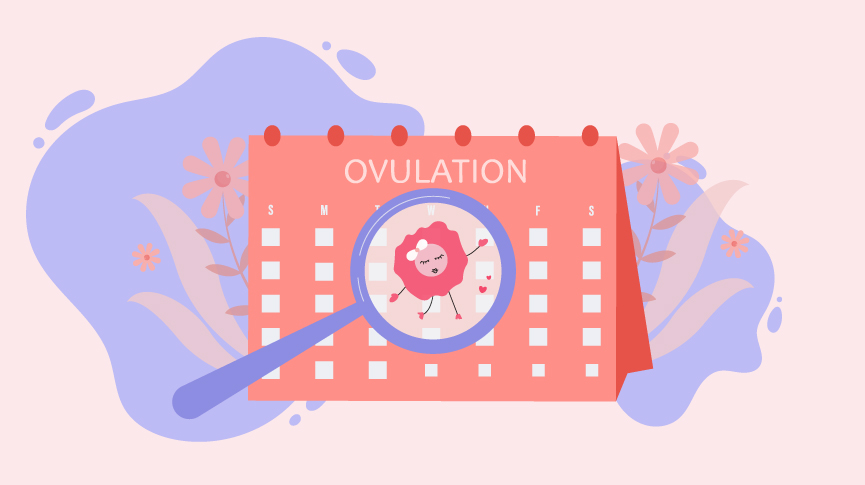The Elusive World of Ovulation

This article was medically fact-checked by Women’s health expert and Gynaecologist Dr. Alyssa Dweck.
Ovulation. You’ve heard the word. Maybe you have a basic understanding of how it works in your body, but have you ever dove headfirst into the somewhat elusive world of ovulation?
Well it’s about time you do.
Ovulation 101
The female body’s ability to ovulate is one of the keynote features that allows us to reproduce.
But what exactly is ovulation? Your egg cells, or ova (ovum singular), are stored in the incredible reproductive organs you know as the ovaries. You are born with all the ova you will ever have, and throughout your reproductive years, will release on average of one of these eggs per menstrual cycle.
With each cycle comes one of two outcomes. Either the egg is fertilized and continues on to the uterus for a potential pregnancy, or in most cases the egg is washed away in your uterine lining that was preparing for fertilization. These eggs only live for twenty-four hours after being released, so they have to act fast!
Typically ovulation occurs about two weeks before your period, the midpoint in a twenty-eight-day cycle. Keep in mind that everyone’s cycle length is different. Some may be longer or shorter, anywhere from twenty-five days to thirty-two is in the range of normal.
Now that you’ve got the basics down, there may be some burning questions that you’ve been waiting to ask. Fear not, we’re here to answer all your ovulation related queries.
Can you release more than one egg?
Yes, you can!
Given that most of your matured eggs will be shed in your period, and never fertilized, you probably won’t know if you release more than one.
Every so often, a woman may release two (or more eggs) that become fertilized. This is how you get fraternal twins, or triplets…and so on.
Does it hurt to ovulate?
It can!
About a third of menstruating people experience “mittelschmerz”, a German word meaning “middle pain”, or pain during ovulation.
There are a few reasons you may get this mid-cycle ache.
- The painful stretching sensation of your ovary as it expands around the growing follicle.
- The feeling of your egg(s) bursting out of the wall of the ovary.
- Or when the fallopian tubes contract to pull the egg towards the uterus.
This typically happens on the side that ovulation is occurring, switching off with each month, but in some cases you may have it on the same side repeatedly.
Mittelschmerz typically only lasts twenty-four to forty-eight hours and doesn’t usually require any treatment.
If you are experiencing intense pain mid-cycle, it could be indicative of a more serious issue like fibroids, ovarian cysts, cancer, or an ectopic pregnancy, and you should consult your doctor.
What are my hormones doing during ovulation?
A lot! Your hormones are always working hard. Your reproductive hormones will pass the baton off throughout your cycle, letting different ones take the lead.
During ovulation, your estrogen and testosterone levels peak.
How do I know when I’m ovulating?
The human body is incredibly intelligent, and while its ovulation cues may be more subtle than other mammals, there are certainly ways to tell.
- A fertile cervix is high and lifted. Meaning that squishy doughnut that serves as the barrier between the vagina and the uterus moves higher up into the body to allow more space for sex and fertilization.
- The cervix also opens up, making it easier for sperm to slide through and do their job.
- Your cervical mucus changes throughout your cycle. For most people, ovulation brings egg white like discharge. It is most likely clear, stretchy, and mucus-like. You may have a lot of it, and be able to stretch it between your fingers.
- Basal temperature. Your body temperature slightly dips, then increases during ovulation and up until your period (unless you become pregnant).
Can I track my ovulation?
Yes, you can!
There are plenty of handy dandy period tracking apps you can use to estimate when you’re ovulating. Keep in mind that you know your body best, and while these apps may be able to help you tell when you’re ovulating, they can’t know for sure.
Using a special basal thermometer can help you track your fertility with your body temperature. This is an awesome way to help aid you in conception, or in avoiding pregnancy.
Try keeping a period journal where you can track how your cervix, discharge, mood, and other symptoms fluctuate throughout your cycle. This can help you get to know your body better, and understand what ovulation looks like for you.
Why do I get horny when I’m ovulating?
Simply put, your body wants you to make a baby!
You’re a mammal, and this is how mammals reproduce. It makes sense that you’re feeling extra juiced up this time of the month, to boost your motivation.
While everyone is different, there are general times where you may be hornier than others. Learn about how your sex drive fluctuates throughout your cycle.
What else might happen when I’m ovulating?
While some may experience a radiant glow, and more extroversion, there are plenty of other totally normal side effects that may come with ovulation.
- Sore breasts. The progesterone that is secreted right after ovulation may lead to sore boobs and nipples.
- Breakouts are normal. Again, chalk it up to hormones.
- Spotting. Some people experience slight spotting from the egg bursting through the ovary.
What can affect ovulation?
Hormonal birth control for one suppresses the body’s natural ovulatory cycle.
Anything that may negatively affect your health like stress, poor diet, and environmental toxins can also suppress ovulation.
Anovulation is when somebody does not ovulate. This can be a side effect of certain drugs like epilepsy medications, cancer treatments, and steroids.
Anovulation can also occur with health conditions like Polycystic Ovary Syndrome (PCOS), thyroid dysfunction, hormonal imbalances.
Menopause of course means the end of ovulation. During perimenopause, ovulation and periods become more and more spaced out as the body ends its fertile years.
What about sex?
Sex while ovulating is totally up to you. On one hand, you may feel extra juiced up and ready to get down, on the other you may want to practice extra caution.
If you’re trying to conceive, this is the time, have at it!
If you don’t want to get pregnant, however, you can try using condoms during ovulation, or try other sexy activities that don’t include penetration!
Facts checked by:
Dr. Alyssa Dweck
Alyssa Dweck MS, MD, FACOG is a practicing gynecologist in Westchester County, New York. She provides care to women of all ages; she has delivered thousands of babies. She is proficient in minimally invasive surgery and has special interest and expertise in female sexual health and medical sex therapy. She is top doctor in New York Magazine and Westchester Magazine. Dr. Dweck has co-authored three books including the most recent release The Complete A to Z For Your V.
Written by:

Natasha (she/her) is a full-spectrum doula and health+wellness copywriter. Her work focuses on deconstructing the shame, stigma, and barriers people carry around birth, sex, health, and beyond, to help people navigate through their lives with more education and empowerment. You can connect with Natasha on IG @natasha.s.weiss.



